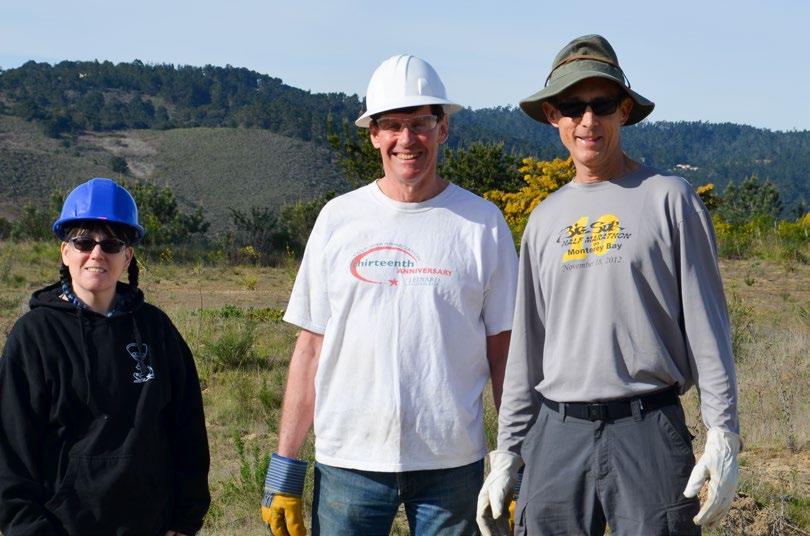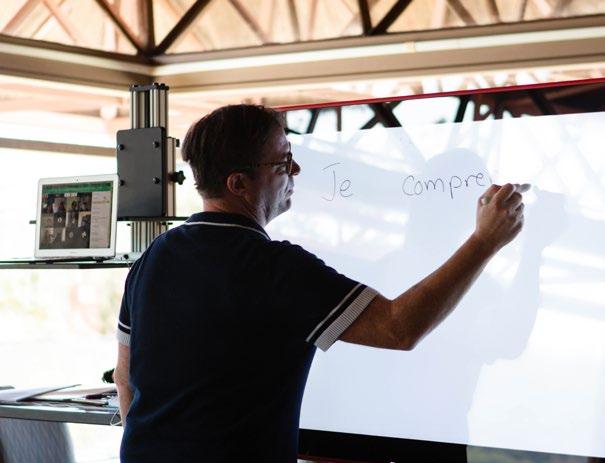
11 minute read
In Focus
ALUMNI STORIES
Pasta Leta: A Passion for Pasta — Leta Merrill ’00
Advertisement
Leta Merrill’s journey to the culinary arts was not a direct one, but began with a love of cooking—and enjoying lots of pasta. Ask her mother and she will tell you that Leta and pasta were meant to be, even from a young age. After studying elementary education in college, she ended up enrolling in the Oregon Culinary Institute in Portland with great enjoyment. Leta soon found herself with a fast-paced, hands-on learning experience at the Union Square Cafe in New York City, honing her craft.
What started as an internship and slicing bread soon became a full-time job preparing oysters and salads, but Leta still dreamed of pasta. “I could see the pasta station from where I was working,” she shared, “and one night I remember the chef caught me and said, ‘You want to work pasta, don’t you?’ because I was just staring and taking it all in. So I remember him catching me watching in awe of the whole thing…. He saw my love of pasta in my eyes, and he put me on the pasta station.” With the help of the sous chefs and Leta’s diligence, she was able to master her art at a professional level.
Fast-forward to a move back to Portland, getting married, raising two boys, and Leta then found herself engaging with the pasta-making world through Instagram. Seeing what other people did inspired her to share her own creativity with the medium. As fate would have it, a cooking store opened up right near her home, and she was asked to teach pasta-making classes on-site.
Through social media entrepreneurship in the Instagram community and her connections through hosting local pasta-making classes and networking, Leta has continued to build her small business in recent years. While she would have spent a good amount of the year traveling to host workshops, due to COVID, she has reinvented and adapted her business model to offer digital cooking classes through the popular Patreon website and selling pasta from her (state certified) home kitchen.
While most of us buy the dried, machine-made packaged pasta at the grocery store, everything Leta makes is hand-shaped from scratch. While she can make multi-colored ravioli to orecchiette to pasta varieties you probably haven’t heard of, when asked for her favorite, Leta would say a simple cacio e pepe: toasted peppercorns and pecorino cheese. Her favorite way to cook, however, depends on what’s in season, selecting whatever looks best at the farmers market that day which she learned back in New York at her first restaurant job. “It’s kind of how the Italians approach cooking,” she said. “The chef taught me a lot about seasonal cooking and how to build a pasta sauce with whatever you have on hand. There’s a basic formula to building the sauce and executing it. Once you have the formula down, you can exchange ingredients as much as you’d like.”
Once quarantines are lifted, Leta looks forward to hosting her pasta-making workshops and traveling to (of course) Italy, sampling different specialties from each region. In the meantime, you can still enjoy her mouth-watering delights online and watch her business grow at @lemneats!
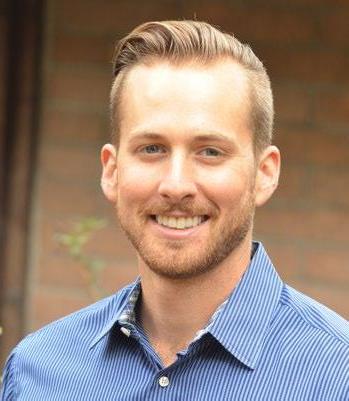
A Sustainable Future Through Biotech — Arye Lipman ’04
A machine the size of a toaster that zaps clean drinking water from the air—it sounds like science fiction, but for biotechnology entrepreneur Arye Lipman ’04 it is another exciting day at work. Arye oversees numerous cutting-edge projects like this at his firm, MarsBio, where he and his team do early seed investing in biotech and life sciences companies, as well as company incubation where they advise and help grow new, smaller companies.
Arye was always drawn to science from the beginning at York, particularly biology, so when it came time to apply for college, UCLA’s excellent life sciences program was a natural fit. UCLA’s unique work-study program allowed him to gain real world experience in a working lab as a technician beginning in his freshman year. This handson job at a cancer biology lab—studying different types of cancer, how they advance, and specific biomarkers—allowed Arye to work his way up, building his skillset and helping him create a network of grad students and professors working in the field. His diligence paid off and he was brought on by a UCLA professor to become a founding member of a cancer diagnostics company. It wasn’t all lab coats and test tubes, as Arye explained, “It was a crazy adventure, learning to go from being a scientist to more of an entrepreneur and an operator. Learning how the world of business works and the world of pharma works.”
After absorbing as much as he could about the industry and years of cutting his teeth at his first job, Arye was looking for a way to give back to the scientific community that taught him everything he knew. “I had a lot of people in my network who were great scientists and had great ideas, but were really struggling to figure out how to turn them into a reality. So I started working on a few different angles to that problem,” he shared.
First was tackling the issue of lab space. Along with a colleague, Arye helped organize rentable lab space—essentially WeWork for biology labs. They ended up building three spaces around Southern California, with eventually 30 to 40 early stage companies. From there, they started seeing a lot of great startups emerge.
It wasn’t only space Arye was looking to help with: funding was also a big challenge for these smaller startups. Location is everything, and while the LA area wasn’t particularly known for being a biotech hub, Arye and his colleagues were able to use their own networks to figure out ways to invest in these companies and connect them with capital. Soon enough, they had created their own venture fund: MarsBio. For the past year and a half at MarsBio, Arye and his colleagues haven’t been sitting back, waiting for the magic to happen. “We don't just give them a check,” he said. “We help them more than that. We work very closely with entrepreneurs to help them build out their team, develop a strategy, and raise more money. We kick the tires on the science.”
Seeing the challenges and opportunities inspired Arye to create solutions in the biotech industry, but he’s not stopping there. While the past twenty or so years has seen biotech support a profitable pharmaceutical industry, he has seen the value in biotech’s intersection with numerous other industries to help make our world better. “How can we develop more nutritious food that's widely available?” he asks. “How can we develop new agricultural techniques that are more sustainable? How can we think about using biology to produce the fuel for our cars? How can we use engineering biology to make new fabrics for our clothing?” They might seem like daunting questions, but luckily Arye has the privilege of talking to some of the most brilliant scientists and has access to some of the world’s most amazing research. Working as a supporter, investor, and scientist, he could soon be able to provide answers.
The most exciting part is Arye isn’t the only one who has access to those brilliant minds. When asked what advice he would give to fellow Falcons interested in the scientific world he shared, “Consider reaching out directly to some of these scientists if you really like their work and learn from them. The vast majority of the scientists are always happy to talk to a young person who is excited about their field.”
Arye is always excited to connect with other York community members interested in science. You can follow his exciting journey and reach him via Twitter @aryelipman.
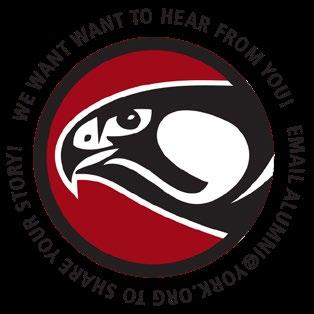
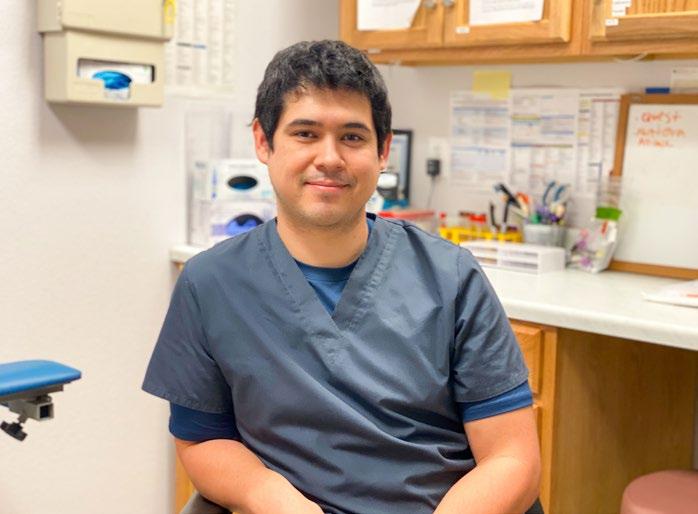
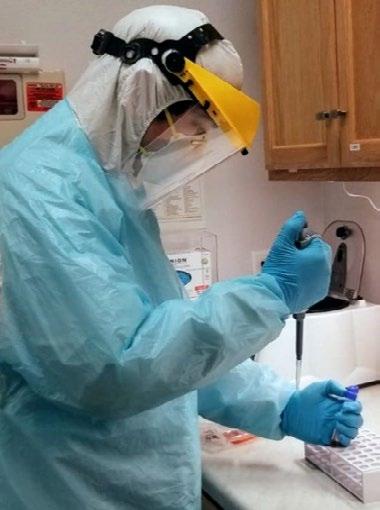
The Smiths Put Their Lab to Work — Spenser Smith ’04
Back in March 0f 2020, when there were limited COVID-19 testing resources in Monterey County, Spenser Smith ’04 and his brother, Bryant Smith ’06, tackled this issue head-on by raising capital for their lab, ARCpoint Labs of Monterey Bay, to procure instant result test kits that are less expensive and easier to be mass-produced.
As Spenser explained, “There just aren’t enough supplies in the system and everyone’s kind of fighting over the same supplies. It’s not really solving anything, it’s just moving it around.” Now with this new testing method, a finger prick and a few drops of blood can help tell if someone has been exposed, how recently, and if they have an active case or have recovered and are now immune.
As Lab Director of ARCpoint Labs, Spenser manages numerous testing procedures like genetics and wellness, food sensitivity, and micro nutrient testing, and he is personally passionate about genetics. During more “normal” times, the laboratory mostly focuses on wellness and genetics testing, the kind you might not receive at a hospital stay. For example, Spenser and his brother work with people who are adopted to help find birth parents as well as those with genetic predispositions. “It’s exciting to live in this particular time period when I can help somebody who has questions about where they came from,” he explained.
Recently, however, Spenser and his team have made a community effort to combat COVID, connecting with other York School classmates and faculty, as well as with first responders and medical professionals to perform tests. “Just as valuable as donations have been, people’s creativity [has been important]” he says. “Talking to each other, exchanging ideas, and connecting to people and resources in the community have been incredibly valuable.” Additionally, while the country continues to report record unemployment numbers, Spenser and his team have increased their staffing numbers due to the influx of lab testing due to COVID. York School has partnered with Spenser and ARCpoint Labs to gain a better understanding of COVID-19 testing and to use their lab for employee testing. Spenser was an important adviser for York School’s COVID Task Force, and he also appeared in the virtual INSPIRE! Auction Gala. We are so proud of the work Spenser ‘04, Bryant ’06, and countless other alumni are doing every day in this great time of need.
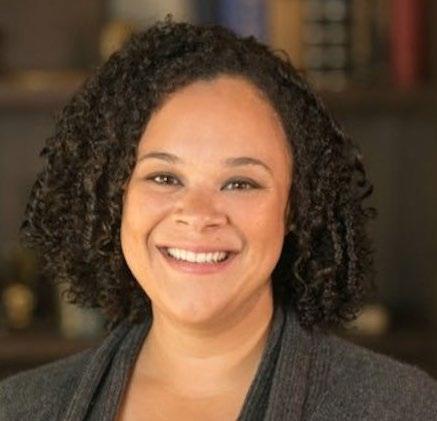
Six Tips for Surviving a Racism Pandemic — Alana Washington ’04
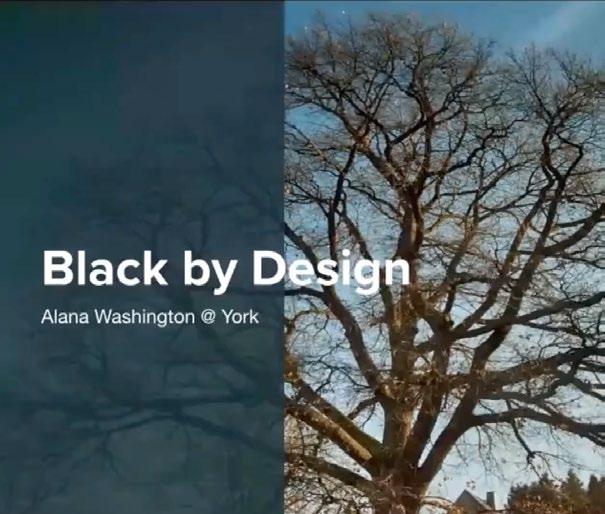
We were delighted and honored to have Alana ’04 speak at one of our forums this year. Alana holds a B.A. from UC Davis with a major in Psychology and English Literature and a minor in African American Studies. She holds an M.A. from NYU in Industrial/ Organizational Psychology. Currently, she is the lead of Shipper Experience Design at Uber Freight. Prior to Uber Freight Alana held design leadership roles at Capital One and GfK Global Research, and she has worked in organizational development at HBO. Alana has served as a conference curator for Rosenfeld’s Design Ops Summit and Adaptive Pathís UX Week and has advised and been a keynote speaker for SF Design Week. Her popular presentations include “Designing for Access” and “Tips for Surviving a Racism Pandemic.” But perhaps most importantly, Alana is a York alumna who made her mark on campus as an excellent student, a valued member of choir, a stunning actor, a wise soul, and a faithful friend.
Here are Alana’s tips for making it through a racism pandemic: Prioritize health and wellness. Breathe, engage with nature, and get the sleep you need. Embrace protopian visioning. We must understand how we’ve arrived at this time, so we need to learn and know the history of domination and slavery. Then we must use our knowledge to envision and create a better world. Be in service to others. When we get in our own heads, in feelings of alienation or self-doubt, or all the other ways we let our egos spiral, the easiest way to get back into purposeful movement forward is to find a way to serve others. Change is political, economic, and social. Work for all three. In communication with others we feel joy, and joy is the only sustaining emotion. Modulate stressors. When we feel overwhelmed, it’s time to disconnect for a while. Practice apologizing. We are human, we all make mistakes. Do not let the difficulty derail you. The best apology is an acknowledgement of harm, a self reflection, a promise to move forward, and is followed by a demonstration of learning. Create milestones for yourself. Write them down and every day work towards those milestones. Every time we check off a step towards our goals, we get a natural dopamine hit. At our forum, Alana encouraged students to educate themselves on the things they are passionate about. Most importantly, she urged them to allow themselves to bring their whole selves to every institution they join. We know we are stronger and better when our diverse community feels empowered to engage fully and honestly, knowing they will be respected, honored, accepted, and cherished. Thank you Alana, for taking the time to share your words of wisdom with our Falcons.

